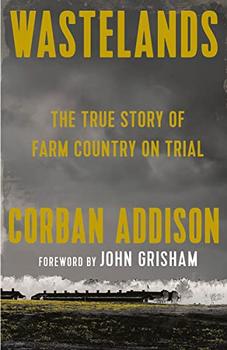Summary | Excerpt | Reviews | Beyond the Book | Readalikes | Genres & Themes | Author Bio

The True Story of Farm Country on Trial
by Corban Addison
This is Beulah Herring's land. And, like the Beulah Land in the hymn that Elsie has sung at church, it is a land of bounty and delight. If the world will do her wrong, it will happen someplace else. Here, there is shelter. There is plenty. There is family.
To ten-year-old Elsie, that is all that matters.
Hallsville Road, Beulaville, North Carolina,
Summer 1958
On that same day, or a day much like it, on a rural plot of land fifteen miles northeast of Wallace, a boy about Elsie's age named Woodell McGowan ventures out into the sun, his eyes fixed on the dark silhouette of forest to the north. His mother, Delores, calls out to him to be home by sundown, then returns to her Sunday chores. She is not the woman who brought him into the world, but she has raised him since the day, seven years ago now, that his birth mother died. As far as Woodell is concerned, Delores and her husband, George McGowan, are his parents. He remembers at the age of three waking up between them in their little house off Hallsville Road. The fact that they are not his blood means nothing to him. They are his family. And this is their land. Hall land. All one hundred acres of it.
The land goes back generations in Delores's line. Woodell knows it like he knows his own home, every crease and fold of it, every patch of field and thicket—hardwood and pine—all the way back to Limestone Creek. The deeds at the courthouse in Kenansville contain a record of the boundaries, but lines drawn on paper mean as much to Woodell as they do to the squirrels and the jays and the crickets that watch over him on his adventures. There are surely places he has yet to see, treasures he has yet to discover, but whatever is out there will not keep its secrets long. He is determined to explore all of it, to map its furthest reaches in his mind, until he can find his way blindfolded. For then, in a way, the land will be his, too.
The big field comes first. Woodell scampers across it in the unhindered manner of youth, half walking, half running, heedless of the motions transporting him. His hands are free, and he is carrying nothing on his back. Where he's going, he has all he needs. Past the field is the big house, where his mother, Delores, and her four siblings were raised. In the family, it's called the "old homeplace." Both of Dolores's parents are gone now. Her father, John Richard Hall, died before Woodell was born, and her mother, Mary Jane Hall, passed more recently.
Like Elsie Herring's grandfather, Immanuel Stallings, John Richard Hall was born in the waning days of the Old South, before the curtain closed on slavery. As the story goes, he was young enough that he sat at the foot of his father's bed and didn't have to work in the fields with the other slaves. Then came the war and emancipation and Reconstruction. As soon as he could manage it, John Richard Hall's father—Delores's grandfather—began acquiring the land that became the one hundred acres. Now that John Richard and Mary Jane are gone, Delores holds title to the land together with her oldest sister, Lillie Belle Hall, and her brother, Raymond.
Beyond the big house, the forest rises up, its branches touching the sky. Woodell races toward the line of shade, then slows when the afternoon sun retreats behind the crown of trees. He enters the woods at a leisurely pace, hopping roots in the speckled light, his feet falling softly on the carpet of leaves and pine needles. As usual, his destination is the creek. But first, he heads toward the camp. He sees the meadow before long, wild grass surrounded by pines, and the tent he fashioned with his own hands, burlap threads spread out over a latticework of branches. If any place in the world is Woodell McGowan's, this is it.
He lies down in the shade of the tent. There is just enough room for him to stretch his legs, but that is all the space he needs. He listens to the calls of the birds and the whisper of the wind moving through the pine boughs. He watches the hawks pirouetting in the sky and the cloud sails floating high above them. While he is alone, he is not lonely. Indeed, he is never happier than when he is by himself in these woods, with nobody but God for company.
Excerpted from Wastelands by Corban Addison. Copyright © 2022 by Corban Addison. All rights reserved. No part of this excerpt may be reproduced or reprinted without permission in writing from the publisher.
He has only half learned the art of reading who has not added to it the more refined art of skipping and skimming
Click Here to find out who said this, as well as discovering other famous literary quotes!
Your guide toexceptional books
BookBrowse seeks out and recommends the best in contemporary fiction and nonfiction—books that not only engage and entertain but also deepen our understanding of ourselves and the world around us.